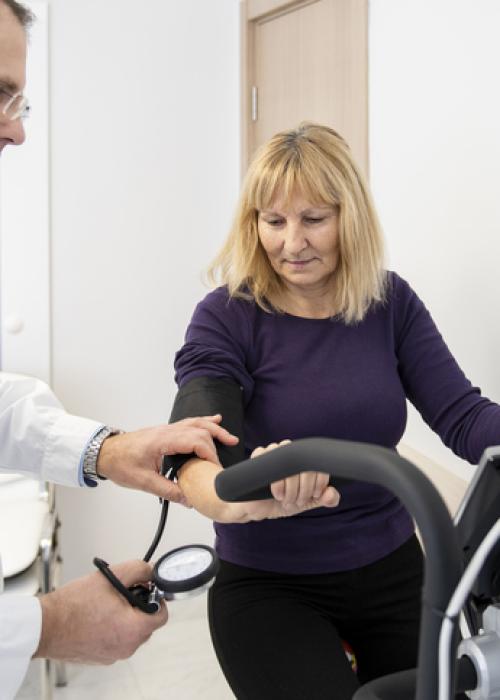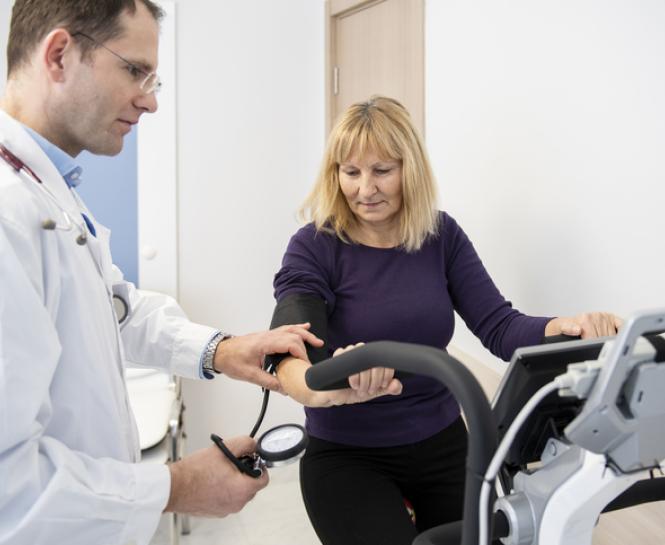"People with hypertrophic cardiomyopathy often do not realize their symptoms are caused by the disease, leading to delayed diagnosis," said Jason Sherer, MD, Catholic Health Cardiologist. "There is no cure, but knowing more about this disease will help more people get diagnosed sooner and start treatment to relieve symptoms."
What is hypertrophic cardiomyopathy?
Hypertrophic cardiomyopathy (HCM) makes it more difficult for your heart to pump blood because the heart muscles are thicker than usual. This disease most often affects the left ventricle in the lower portion of the heart. A muscular wall, called the septum, separates the two lower ventricles. When these muscles are too thick, blood flow to the rest of the heart can be reduced or blocked.
HCM has two types. Obstructive HCM is the most common, where the septum thickens and obstructs blood flow to the rest of the heart. In non-obstructive HCM, the heart muscle is thickened, but blood flow from the heart is not blocked.
Who is at risk for hypertrophic cardiomyopathy?
HCM is a genetic disease inherited from your parents. It is the most common genetic disease of the heart muscle. A genetic mutation, or changes in your genes, cause the heart muscle to thicken abnormally.
"If you have a parent or sibling with hypertrophic cardiomyopathy, you need to talk to a cardiologist and get tested," said Dr. Sherer.
Although rare, HCM is also the most common cause of sudden cardiac death in young people and competitive athletes in the United States.
What are the symptoms of hypertrophic cardiomyopathy?
"You may have few or no symptoms with hypertrophic cardiomyopathy, and they can develop at any point in your life," said Dr. Sherer. "The severity of your symptoms and when you experience them will differ from those of a family member or someone else with the disease."
Symptoms of hypertrophic cardiomyopathy include:
- Abnormal heart rhythm
- Chest pain
- Feeling lightheaded or dizzy
- Shortness of breath
- Swelling in your legs, feet or neck
"These symptoms may often be mistaken for another health condition or dismissed as 'something that will pass,' which contributes to hypertrophic cardiomyopathy being underdiagnosed," said Dr. Sherer. "Talk to your doctor to get evaluated, but seek immediate help if you have chest pain."
How is hypertrophic cardiomyopathy diagnosed?
Your doctor will perform a physical exam and listen to your heart and lungs. They will also ask you about your family medical history to learn if you have a relative with a heart condition.
Tests will also be ordered to confirm the diagnosis, including an electrocardiogram (ECG or EKG), an echocardiogram, or a cardiac MRI. If your symptoms only occur during exercise, your physician may ask you to take a stress test on a treadmill. Genetic testing can also reveal more about your medical history.
What are the risks of having hypertrophic cardiomyopathy?
Most people with hypertrophic cardiomyopathy have few complications, but for others, it may cause additional health issues such as:
- Atrial fibrillation
- Blood clots
- Heart failure
- Mitral valve disease
- Stroke
- Sudden cardiac death
“These are life-threatening issues, emphasizing the importance of talking to your doctor if you have a genetic history or are noticing symptoms,” said Dr. Sherer.
How can I treat hypertrophic cardiomyopathy?
"Since there is no cure for hypertrophic cardiomyopathy, the focus is on symptom management," said Dr. Sherer. "In addition to exploring medication treatment options, symptoms and future complications can be reduced or prevented with lifestyle changes. That includes managing weight, exercising regularly, getting enough sleep, quitting smoking, and avoiding alcohol."
Medications like beta-blockers and calcium channel blockers can help your heart pump blood more efficiently. Other medicines can help your heart stay in rhythm or thin your blood so it more easily flows through the heart.
If medications do not effectively manage your symptoms, your cardiologist may suggest a surgical procedure to thin the septal wall and improve blood flow. They may also insert an implantable cardioverter-defibrillator (ICD) to monitor your heartbeat.
"Because hypertrophic cardiomyopathy is a chronic disease that can worsen over time, our goal is to diagnose and start treatment early so debilitating symptoms or heart failure do not occur," said Dr. Sherer. "We do not want the disease to interfere or prevent you from living a healthy, productive life."







